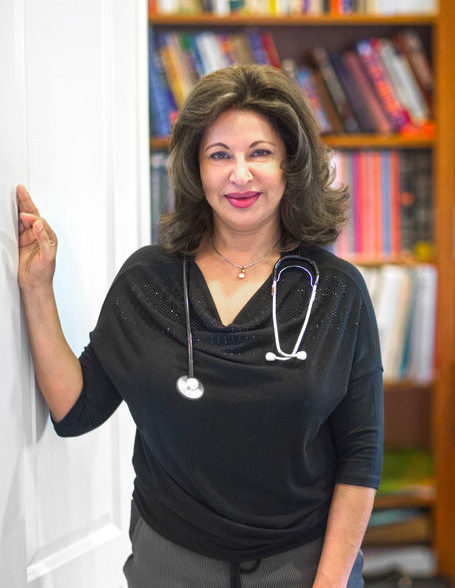
Inflammation has a bad rap, and rightly so, but there is such a thing as good inflammation. Let’s say you wrench a knee, or get a deep cut – your nerve endings send signals that recruit white blood cells, which protect and heal by fighting off foreign bodies. This type of inflammation is called “acute.”
Then there’s the other kind of inflammation – referred to as chronic, or systemic. It occurs when the body’s immune system goes haywire and initiates inflammation when it is not needed; this interferes with the body’s healthy tissues.
Dr. Deepti Sadhwani, of Quality Health Care & Wellness in Vero Beach and Sebastian, is board-certified in internal and bariatric medicine; she is also an expert on inflammation. Dr. Sadhwani says “inflammation is the mother of every disease in mankind.”
Inflammation plays a direct role in some diseases; one example is rheumatoid arthritis. RA is an autoimmune disorder that causes inflammation of the tissue around joints; it can also cause damage elsewhere in the body.
As the name suggests, inflammation is also directly connected to Inflammatory Bowel Diseases (IBD); including Crohn’s disease, a condition in which the immune system attacks harmless bacteria in the intestines, resulting in chronic inflammation of the gastrointestinal tract. Ulcerative colitis is another example of an IBD.
In a less direct way, inflammation has been linked to many other conditions, including allergies, diabetes, depression, heart disease, Alzheimer’s and cancer.
Dr. Sadhwani says inflammation can be controlled through good eating habits and high-grade dietary supplements. The Mediterranean Diet is a healthy approach to eating; it includes eating plenty of fruits and vegetables, small portions of nuts, red wine in moderation, lots of fish, and very little red meat. The Mediterranean Diet also advocates swapping trans fats and saturated fats for more healthy fats, such as olive oil.
Dr. Sadhwani says not all olive oils are created equal; to have health benefits, the oil must be high in polyphenols, an anti-oxidant. The amount of polyphenols depends on when the olive was harvested; there are more polyphenols in earlier harvests. But just because the bottle says “extra virgin,” it doesn’t mean the olives were harvested early and are high in polyphenols, as the United States doesn’t have strict regulations regarding the use of that term. Dr. Sadhwani recommends the brand Olio Beato to her patients; it is organic as well as being high in polyphenols.
High levels of polyphenols are also found in certain seasonings, including cloves, dried peppermint, star anise and celery seed. Cocoa products are also high in polyphenols; happily, this includes dark chocolate.
A highly purified fish oil supplement is essential to fight inflammation, says Dr. Sadhwani. Berry supplements, such as acai, can also help. Dr. Sadhwani spoke of turmeric, the spice that gives curry its yellow color. “It’s good for inflammation and for the brain and may help fight Alzheimer’s,” she says.
Probiotics has become a bit of a buzzword in recent years; it is a “friendly bacteria” that is known to keep a healthy balance in the gut and boost the immune system, which can help fight inflammation. Yogurt is the most familiar food source (look for the words “live and active cultures” on the label); there are other sources as well, including miso soup, sauerkraut, poi and green pickles. And avoid overusing antibiotics; they kill good bacteria along with the bad.
Other guidance on preventing chronic inflammation:
• Don’t smoke. Smoking is an assault on the lungs; resulting in the over-compensation of white blood cells, which can lead to lung disease.
• Exercise, moderately. Yes, exercise is highly recommended, but there are studies that indicate that exercising for more than 60 minutes at a time may actually cause inflammation levels to spike for a day or two.
• Prevent gum disease. Researchers now think that the bacteria which cause swelling and inflammation in the gums can result in inflammation and thickening of the arteries. So, brush and floss twice a day; and if you have gum disease, don’t delay in getting it treated.
• Stay calm. Sudden bouts of anxiety caused by external or internal stimuli have been linked to heightened levels of inflammation. Lower your stress levels by trying not to obsess over worst-case scenarios.
According to Dr. Sadhwani, the “gold standard” for measuring cellular inflammation is testing the ratio of two essential fatty acids (AA and EPA) in the blood; the lower the ratio, the better. Unfortunately, this test is often not covered by insurance. There is an alternative blood test that measures CRP, a protein in the blood which acts as a proxy for inflammation.
https://www.healthfitnessremedy.com/ This test measures general levels of inflammation and can identify and keep track of infections and diseases that cause inflammation.
In the last decade, there has been an interesting shift in thinking about asthma as related to inflammation. The focus used to be on the narrowing of the bronchial tubes due to the contraction of the bronchial muscles; now, there is also emphasis on treating the inflammation of the bronchial tubes that is seen in asthma sufferers.
Treating chronic inflammatory diseases with medication is problematic. Although treatment with a class of steroid hormones called glucocorticoids is common, they have serious side effects if taken long term – including liver damage, fluid retention, high blood pressure and increased infection risk.
Very recently, researchers from Georgia State University conducted a study on glucocorticoids. They believe their findings may eventually result in new therapeutic strategies to control overactive inflammation without the harmful side effects, but that is far from being a reality.
There are drawbacks to most medications; so diet, dietary supplements, and sensible exercise will likely remain the best approach to preventing chronic inflammation for many years to come.
Quality Health Care & Wellness is located at 12920 U.S. Highway 1 in Sebastian (7720-581-2373) and at 8701 U.S. Highway 1 in Vero Beach (772-228-8480).



